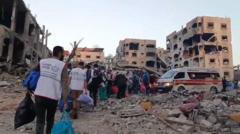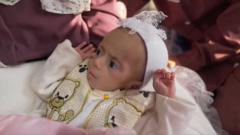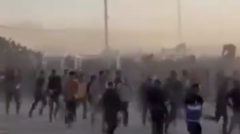The final healthcare facility in North Gaza, al-Awda hospital, has ceased operations following a forced evacuation by Israeli military authorities, leading to significant concerns over public health and safety in the region amidst ongoing hostilities.
North Gaza's Last Hospital Forced to Evacuate Amid Ongoing Conflict

North Gaza's Last Hospital Forced to Evacuate Amid Ongoing Conflict
With the al-Awda hospital's evacuation, healthcare availability in North Gaza has been critically diminished as conflict escalates.
The last remaining hospital in North Gaza, al-Awda, has been evacuated following an Israeli military order, leaving the region without functioning healthcare facilities, according to Dr. Mohammed Salha, the hospital director. In an interview, Dr. Salha expressed the anguish felt by staff while evacuating patients amid danger. He noted the Israeli Defence Forces (IDF) threatened that failure to comply would result in casualties either from military action or bombings.
The hospital, located in Jabalia, faced heavy bombardment and shooting throughout Thursday; however, Dr. Salha had initially resisted the order due to patients' urgent medical needs, proposing instead that he and several staff members remain behind. The military refused this offer, resulting in a tense seven-hour negotiation process. Ultimately, patients were transported over 300 meters to ambulances parked away from the hospital due to severely damaged access routes. Videos shared with the BBC depicted patients being loaded into ambulances at sunset, followed by a convoy leaving Jabalia later that night.
The World Health Organization (WHO) stated that due to the ongoing conflict, al-Awda’s medical equipment could not be relocated, further jeopardizing the health services available to the population. The closure of al-Awda has severed crucial access to healthcare for the Northern Gaza region, causing alarm among humanitarian agencies.
Dr. Salha mentioned that care would be redirected to a primary health facility in Gaza City and a new center might be set up in a shelter. WHO Director-General Tedros Adhanom Ghebreyesus highlighted the risks posed by the closure, stressing the need for the protection of healthcare and civilians amidst violent hostilities.
The IDF had declared various areas within Gaza as combat zones, directly connecting the evacuations to ongoing military operations against groups identified as terrorists. Al-Awda had previously faced significant damage, sustaining multiple attacks that injured staff and compromised the hospital's functionality.
As hostilities continue, many Palestinians in Gaza, including those displaced, suffer from severe shortages of food, medicine, and other necessities. The situation is further complicated by logistical issues for humanitarian groups attempting to deliver aid in a region described by officials as facing a "critical risk" of famine.
International pressure on Israel to increase the flow of humanitarian support is mounting. However, aid distribution remains chaotic, with local populations struggling to access the needed resources. Events in Gaza have garnered significant international attention, with calls for governments to advocate for relief and condemn the human rights implications of the ongoing blockade and military activity.
As the conflict spirals, more than 54,000 lives have been lost in Gaza since the escalation began, raising urgent concerns from global communities about the humanitarian crisis.
The hospital, located in Jabalia, faced heavy bombardment and shooting throughout Thursday; however, Dr. Salha had initially resisted the order due to patients' urgent medical needs, proposing instead that he and several staff members remain behind. The military refused this offer, resulting in a tense seven-hour negotiation process. Ultimately, patients were transported over 300 meters to ambulances parked away from the hospital due to severely damaged access routes. Videos shared with the BBC depicted patients being loaded into ambulances at sunset, followed by a convoy leaving Jabalia later that night.
The World Health Organization (WHO) stated that due to the ongoing conflict, al-Awda’s medical equipment could not be relocated, further jeopardizing the health services available to the population. The closure of al-Awda has severed crucial access to healthcare for the Northern Gaza region, causing alarm among humanitarian agencies.
Dr. Salha mentioned that care would be redirected to a primary health facility in Gaza City and a new center might be set up in a shelter. WHO Director-General Tedros Adhanom Ghebreyesus highlighted the risks posed by the closure, stressing the need for the protection of healthcare and civilians amidst violent hostilities.
The IDF had declared various areas within Gaza as combat zones, directly connecting the evacuations to ongoing military operations against groups identified as terrorists. Al-Awda had previously faced significant damage, sustaining multiple attacks that injured staff and compromised the hospital's functionality.
As hostilities continue, many Palestinians in Gaza, including those displaced, suffer from severe shortages of food, medicine, and other necessities. The situation is further complicated by logistical issues for humanitarian groups attempting to deliver aid in a region described by officials as facing a "critical risk" of famine.
International pressure on Israel to increase the flow of humanitarian support is mounting. However, aid distribution remains chaotic, with local populations struggling to access the needed resources. Events in Gaza have garnered significant international attention, with calls for governments to advocate for relief and condemn the human rights implications of the ongoing blockade and military activity.
As the conflict spirals, more than 54,000 lives have been lost in Gaza since the escalation began, raising urgent concerns from global communities about the humanitarian crisis.





















